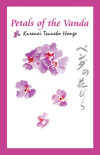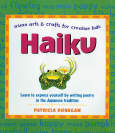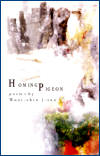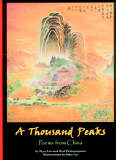|
How Petals of the Vanda by Kurenai Tsuneko Hongo came together reminds me of Emily Dickinson's startling poetic life discovered upon her death. She left behind a treasury of poetry, mounds of little packets called "facsicles" neatly tied with ribbons and hidden away in a locked box. Emily meant for them to be found, otherwise they wouldn't exist; she simply didn't want to be around for the public handling of her words, ideas, and obsessions so privately born. The similarity I see between Emily's and Kurenai's unveiled artistry is their family's recognition of their prolific work as something that should be given to the world, not kept locked away or treated as a guarded heirloom. For Kurenai's family, whatever the obstacles - wars, internment, political and social changes; personal ups 'n downs; the passage of time - they were overcome to reach this point of publishing Petals of the Vanda thirty-six years after Kurenai's death. And the world is ever grateful for their effort.
Kurenai's poetry is called tanka, an ancient Japanese poetry form described by Hatsue Hongo Kawamoto as "pure, simple, spontaneous creations, and yet they have a depth of subtle meaning." Tanka is only true if there is not "too much thought" going into its writing. Otherwise, it is "no longer an expression of the true self."
In a spontaneous tanka moment Kurenai captures a tenacious void.
Half a century has passed already in this land
Yet there is a feeling that something is still missing
She has lived in Hawai`i these many years but the yearning for her homeland of Japan has never gone away. Her feeling reflects the irrepressible question, "What am I doing here?" that pops up for all of us in the most familiar surroundings. As a transplant in California for almost five decades, I know the feeling well even when I'm spouting that Hawai`i is no longer my home. It seems that where we are born and raised refuses to be forgotten; it doesn't matter how long, how settled, and how habituated our adopted environments become. Something will always be missing because there is no substitute for our rich memories of childhood further entwined with nature.
Violets I had picked under the cherry blossoms
Oh, those lovely spring days at Koganei are now far, far away
Kurenai's poetic life was renewed once her eight children were grown and on their own. It is at this time that she dedicates herself to her art. In her maturity, I sensed her urgency to capture memories, feelings, observations, and bursts of joy. She confronts nothingness with contentment.
In the soft rain, I pick red plums
I am absorbed in nothingness, how refreshing it is!
|
While expressing her creativity in this tight and disciplined poetic form of tanka, Kurenai delights in being fully alive in a scene that turns practically tangible.
From the heights swoops down the milky mist
And instantaneously enwraps me on the road
We can imagine her standing still on the road, watching the fog's whiteness move toward her in an embrace and then, surrendering to that embrace. Kurenai's tanka offers glimpses of her passion for nature and being fully engaged in it. Her words evoke a physicality that cannot be denied.
On New Year's Day, as I contemplate on poems,
I vaguely long for the odor of Chinese ink
Her sensitivity and humanity present themselves throughout her tanka with the careful structuring of the book in focused categories, including "Flowers," "Birds," "Friends," "Children," and "Life." In the "Life" chapter, I was breathless at this revelation:
At the end of a majestic line of leaves
Like red lips parted the orchid blooms
All I could think of was Wow. Especially interesting are Kurenai's experiences of Hawai`i's transformation from when she arrived in 1911. In the more than half-century that she lived in the Islands, she witnessed its transformation and creates a still-life of the past.
Long ago passing through the kiawe woods
I rode a horsedrawn buggy to an inn in Waikiki
When she writes of things Hawaiian in the tanka form, I can't help but consider the biculturalism she lived, of the rich Japanese heritage she remembered far away and the immediate tropics filling her senses.
The evening of this southern land
Their sad stories are sung by the natives to the strum of guitars
It's a gift that this view upstages that of the happy-go-lucky Hawaiians, giving them a right to their sadness for what they have lost. In their songs and music, it's true, Hawaiians find comfort in all that has been taken from them.
Congratulations to Kurenai's son and Petals of the Vanda Executive Editor Mansanori Hongo for the culmination of this project. Kurenai's love for her art brings happiness to us all and will live on with this book.
On days when the silvery delicate rain falls
My mind overflows with poems.
|




